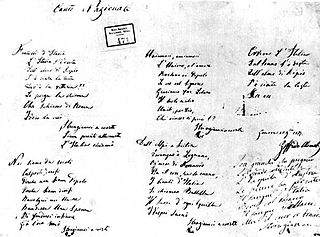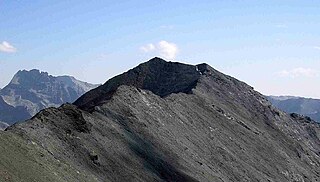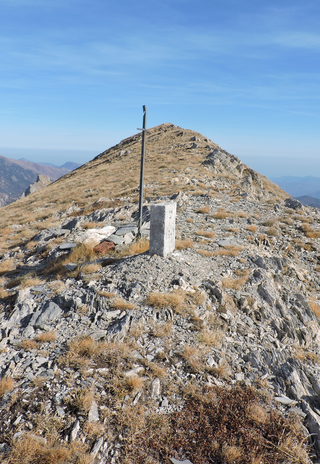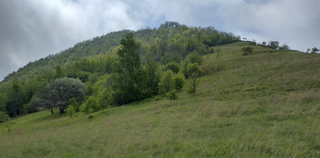
The Dolomites, also known as the Dolomite Mountains, Dolomite Alps or Dolomitic Alps, are a mountain range located in northeastern Italy. They form part of the Southern Limestone Alps and extend from the River Adige in the west to the Piave Valley in the east. The northern and southern borders are defined by the Puster Valley and the Sugana Valley. The Dolomites are located in the regions of Veneto, Trentino-Alto Adige/Südtirol and Friuli Venezia Giulia, covering an area shared between the provinces of Belluno, Vicenza, Verona, Trentino, South Tyrol, Udine and Pordenone.

"Il Canto degli Italiani" is a canto written by Goffredo Mameli set to music by Michele Novaro in 1847, and is the current national anthem of Italy. It is best known among Italians as the "Inno di Mameli", after the author of the lyrics, or "Fratelli d'Italia", from its opening line. The piece, in a time signature of 4/4 and the key of B-flat major, consists of six strophes, and a refrain sung at the end of each strophe. The sixth group of verses, which is almost never performed, recalls the text of the first strophe.
The 1981 Giro d'Italia was the 64th running of the Giro. It started in Brescia, on 13 May, with a 6.6 km (4.1 mi) prologue and concluded in Verona, on 7 June, with a 42 km (26.1 mi) individual time trial. A total of 130 riders from thirteen teams entered the 22-stage race, that was won by Italian Giovanni Battaglin of the Inoxpran team. The second and third places were taken by Swede Tommy Prim and Italian Giuseppe Saronni, respectively.

The Alpini are a mountain infantry corps of the Italian Army, that distinguished itself in combat during World War I and World War II. In addition they are also famous in Italy for their songs and choirs.

The 1989 Giro d'Italia was the 72nd edition of the race. It started off in Taormina on 21 May with a 123 km (76.4 mi) flat stage that ended in Catania. The race concluded in Florence with a 53 km (32.9 mi) individual time trial on 11 June. Twenty-two teams entered the race, which was won by the Frenchman Laurent Fignon of the Super U team. Second and third respectively were the Italian Flavio Giupponi and the American rider, Andrew Hampsten.
The Corale Alpina Savonese (CAS) is an Italian all-men a cappella chorus from Savona (Italy). Since 1987 it is directed by Eugenio Alipede.

Flavio Bucci was an Italian actor, voice actor and film producer.
The Cima Coppi is the title given to the highest peak in the yearly running of the Giro d'Italia, one of cycling's Grand Tour races. The mountain that is given this title each year awards more mountains classification points to the first rider than any of the other categorized mountains in the race.

Pointe de Paumont or Cima del Vallone is a mountain of Savoie, France and of the Province of Turin, Italy. It lies in the Cottian Alps range. It has an elevation of 3,171 metres above sea level.

Le Laudi, Op. 25, is an oratorio by the Swiss composer Hermann Suter. The full title is Le Laudi di San Francesco d'Assisi . The text is Francis of Assisi's Canticle of the Sun in the original Italian. Suter scored the work for soloists, choir, children's choir, organ and large orchestra. It was premiered in 1924, with the composer conducting the Basler Gesangverein on the occasion of its centenary. The oratorio of around 70 minutes is one of Suter's most important works and has been championed by conductors such as Wilhelm Furtwängler, who conducted the first performance in Vienna in 1926 and further performances in Europe. Although now performed relatively rarely elsewhere, it has been presented regularly in Switzerland. It was also recorded in 1991 and 2007.

Marco Frisina is an Italian Roman Catholic priest and composer. He is director of the Pastoral Worship Center at the Vatican.

Ohannés Gurekian was an Armenian architect, engineer, and alpinist.

Giuseppe Zeno is an Italian actor of cinema, theatre and television.

Lodovico delle Colombe was an Italian Aristotelian scholar, famous for his battles with Galileo Galilei in a series of controversies in physics and astronomy.

Cima di Pertegà (Italian) or Cime de la Pertègue (French) is a mountain located on the French-Italian border between Piemonte and Provence-Alpes-Côte d'Azur.

Diari aperti is the tenth studio album by Italian singer Elisa, released by Universal Music Group on 26 October 2018. The singer's first concept album, it is her second album released entirely in Italian after L'anima vola (2013).
This is a list of Italian television related events from 1970.
Gloria Radulescu is an Italian actress.

Monte Peso Grande o Castell'Ermo (1.092 m) is a mountain of the Ligurian Prealps, the eastern section of the Ligurian Alps.

The Monte Alpe is a mountain of the Ligurian Prealps, the eastern section of the Ligurian Alps.















